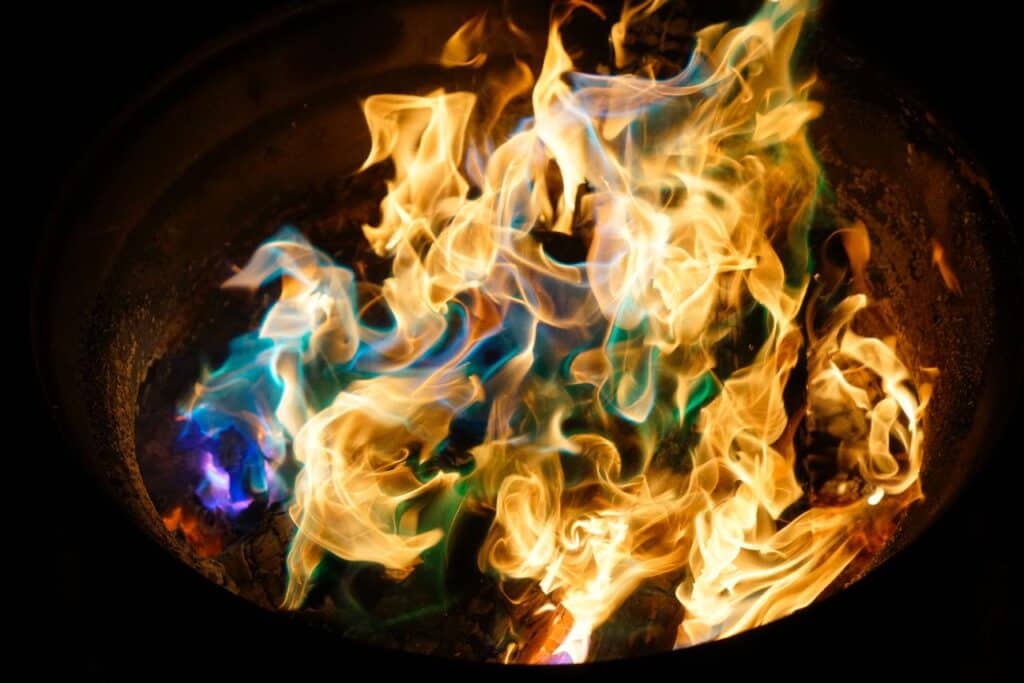Acetone is something we come across more often than we might realize in day-to-day life. The most common application in the home is as a nail varnish remover as it acts as a solvent for the nail varnish dissolving it and making it easy to clean from the fingernail. You might also have used an acetone-based cleaner in the classroom for board pens. But is acetone a fire hazard and should we be careful when using it?
Acetone is a highly flammable organic chemical that easily ignites at room temperature. In gas form, it can be a serious explosion hazard as well.
So, it’s vital that you store acetone and handle it carefully even in small quantities. Take a look.
Your # 1 priority is keeping your family safe. As a firefighter, I recommend everyone has updated smoke detectors that don’t require battery changes, like these ones from Kidde, a fire extinguisher, like this one from Amerex, and a fire escape ladder if you have bedrooms above the first floor, I recommend this one from Hausse.
Also read: What Makes Something Flammable?
What Is Acetone?

Acetone is a “ketone” and is the simplest of the ketones, with a chemical formula of (CH3)2CO.
It has no color and a very distinct odor that once smelled, cannot be forgotten easily.
It has to be produced chemically and does not occur in any significant quantities naturally and it was first manufactured back in 1606!
However, the modern method of producing acetone is simpler than the one that would have been used back then.
It is simply produced by a reaction of propylene, a gas which is produced by “steam cracking” propane gas.
It is an important chemical for industry and the most recent figures available show that around 7 million tons are produced globally each year and 1.5 million of those are made in the United States.
It is a relatively expensive chemical too with a ton costing over $1,000.
How Is It Used?
While nail polish remover may be the most common use that the majority of us encounter in our lives, the majority of acetone is used in chemical production in industry, and it is a precursor for a huge range of organic chemicals.
It can also be used as a paint thinner.
In the United States, it has been given a specific exemption from being considered a “Volatile Organic Compound (VOC)” but in the European Union, it is listed as a potential pollution threat.
We have some acetone present in our own bodies, and it is a waste product of certain metabolic processes, and its presence can be increased through “ketosis” (the keto-genic diets that are popular today can cause this and so can diabetes).
Acetone and other ketones may also be used in medicine to help prevent young children and babies from having epileptic seizures.
Is Acetone Flammable?
Yes. Acetone is a highly flammable substance and will easily ignite at room temperature. As such it should always be stored in a sealed container and in a cool, dark place.
When in use it should be kept away from naked flames and any potential sources of electrical sparks and used in a well-ventilated space to prevent fumes from building up.
How Does Acetone Catch Fire?
Yes, acetone burns very easily and produces a hot flame. The good news is that the byproducts of burning acetone are carbon dioxide and water (or potentially carbon monoxide if there is not enough oxygen present).
This means that it is a relatively clean-burning compound and the byproducts, assuming adequate ventilation, will not do any particular harm if inhaled.
However, if there is not enough ventilation present, then carbon dioxide might build up and present an asphyxiation risk.
Why Is Acetone So Flammable?
Acetone is so flammable because it’s a gaseous hydrocarbon which means that the bonds between the individual molecules are weak and the bonds between the atoms are not as strong as they can be either.
Thus, when you add heat, there’s no need to break the inter-molecular bonds and the atom-atom bonds break very easily.
Is It Explosive?
Liquid acetone is not an explosion hazard. However, as the substance is volatile (no matter its status as a VOC or not) acetone will evaporate over time and the acetone vapor is an explosion risk.
This is why it is important to seal a container of acetone when it is not in use. Even a small bottle of acetone, such as that used to remove nail polish, can present an explosion hazard if enough of it is vaporized.
It’s also worth noting that if acetone were to be aerosolized such as by using a spray bottle, the resultant spray would also be an explosion hazard due to the change in surface area to volume of the liquid.
Can It Spontaneously Combust?
Yes, in fact, it’s very important when you put acetone on a rag or a piece of paper to clean with it, that you don’t throw the wet rags in the garbage.
As they dry out, they produce acetone vapor and because this is very combustible, it becomes a fire risk but… the acting of drying cloth also produces heat which could, potentially, set fire to the acetone with no need for a spark or flame.
Is Acetone Flammable When Dry? Does It Fully Evaporate?
Acetone does fully evaporate in that, if left for long enough, the liquid acetone will eventually all become vapor and leave behind a dry surface.
That dry surface is not flammable (unless it is made out of other flammable or combustible materials) but the acetone vapor remains flammable and potentially an explosion hazard even after it has dispersed in the air and traveled.
This is an important thing to know because it means you can’t rely on ventilation in a larger building to carry the vapor outside and therefore, must work under strict safety protocols if using large amounts of acetone.
Does Acetone Evaporate If Left Open?
Yes, eventually, a bottle of acetone will evaporate if it is left open (though it may take some time to do so depending on the specific local conditions) and the vapor will be a hazard when this happens.
What Residue Does It Leave Behind?
Acetone, under most circumstances, will not leave a residue when it is used as a cleaning agent, and this is one of the reasons it’s popular for use as a nail varnish remover.
However, if you use acetone as a cleaner and find that it does leave a residue, you should wipe this away using isopropyl alcohol (IPA) which will dissolve the acetone residue and prevent you from creating a fire hazard.
Can You Pour Acetone Down The Drain (Sink, Toilet)?
No. Acetone is a powerful solvent and while you might think that’s exactly what’s needed to shift a blockage in a pipe, it won’t stop by dissolving the blockage and might just dissolve any plastic or rubber seals or piping too.
Also, as it is an explosion hazard as a vapor, it might also evaporate in the pipes and potentially start a fire.
Is Inhaling Acetone Harmful?
In small quantities, acetone vapor is not considered to be harmful, but in larger amounts, it can causes irritation to the airways, nose, lungs, eyes, etc.
And eventually, it can cause a headache, confusion, a mild high, rapid pulse rate, nausea, vomiting, affect the menstrual cycle and even cause a coma or death.
Acetone is toxic enough when inhaled that the abuse potential is minimal, as acetone poisoning is no fun at all.
Can You Drink Acetone?
As it’s a liquid, you COULD drink acetone, but you really SHOULDN’T.
While there is some acetone present in the blood and body already, it’s poisonous in large quantities and a mouthful is enough to make you severely ill.
It can cause all the same symptoms as inhaling it and also burn the digestive system and your mouth and throat.
If you do drink it by accident, don’t induce vomiting (it can cause even more damage on its way back up), do call 911, explain how much has been consumed, and then flush your mouth water and wait for help.
The treatment may involve blood tests, breathing tubes, IV fluids and even having your stomach pumped. It’s best not to drink acetone in the first place.
Is It A Carcinogen?
No, as far as medical science is aware at this moment in time, acetone is not carcinogenic and it has not been classified by any major body as a carcinogen.
Sources:
1 2 3 4 5 6 7 8 9 10 11 12 13 14 15 16

